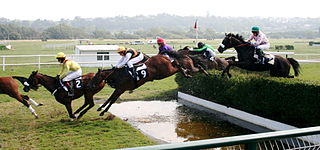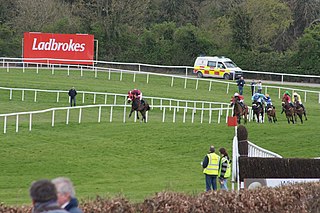
Thoroughbred horse racing is a sport and industry involving the racing and hound racing of Thoroughbred horses. It is governed by different national bodies. There are two forms of the sport: flat racing and jump racing, called National Hunt racing in the UK and steeplechasing in the US. Jump racing can be further divided into hurdling and steeplechasing.

Middleburg is a town in Loudoun County, Virginia, United States, with a population was 673 as of the 2010 census. It is the southernmost town along Loudoun County’s shared border with Fauquier County.
In horse racing in the United Kingdom, France and the Republic of Ireland, National Hunt racing requires horses to jump fences and ditches. National Hunt racing in the UK is informally known as "jumps" and is divided into two major distinct branches: hurdles and steeplechases. Alongside these there are "bumpers", which are National Hunt flat races. In a hurdles race, the horses jump over obstacles called hurdles; in a steeplechase the horses jump over a variety of obstacles that can include plain fences, water jump or an open ditch. In the UK the biggest National Hunt events of the year are generally considered to be the Grand National at Aintree and the Cheltenham Gold Cup.

The Cheltenham Festival is a meeting in the National Hunt racing calendar in the United Kingdom, with race prize money second only to the Grand National. The four-day festival takes place annually in March at Cheltenham Racecourse in Cheltenham, Gloucestershire. It usually coincides with Saint Patrick's Day and is particularly popular with Irish visitors.
The Triumph Hurdle is a Grade 1 National Hunt hurdle race in Great Britain which is open to horses aged four years. It is run on the New Course at Cheltenham over a distance of about 2 miles and 1 furlong, and during its running there are eight hurdles to be jumped. The race is for juvenile novice hurdlers, and it is scheduled to take place each year during the Cheltenham Festival in March.

A point-to-point is a form of horseracing over fences for hunting horses and amateur riders. In Ireland, where the sport is open to licensed - i.e. professional - trainers, many of the horses will appear in these races before they compete in National Hunt races. Consequently, the Irish point-to-point is more used as a nursery for future young stars: a horse that wins its debut point-to-point in Ireland will often sell for a lot of money. Whilst professional trainers are specifically excluded from running horses in point-to-points in Great Britain, the days of the farmer running his hunter at the local point-to-point have gone. Increasingly, horses are run from "livery yards" - unlicensed but otherwise professional training establishments, sometimes closely allied with a licensed yard.

A steeplechase is a distance horse race in which competitors are required to jump diverse fence and ditch obstacles. Steeplechasing is primarily conducted in Ireland, the United Kingdom, Canada, United States, Australia and France. The name is derived from early races in which orientation of the course was by reference to a church steeple, jumping fences and ditches and generally traversing the many intervening obstacles in the countryside.
A novice in horse racing is an inexperienced racehorse which has not run in a certain number of races of a particular type, or not won in such races. The definition of a novice is determined by the horse racing authority in a particular country or area.
Frank David “Dooley” Adams was an American steeplechase jockey who was inducted into the National Museum of Racing and Hall of Fame in 1970.

Punchestown Racecourse is located in the parish of Eadestown, between the R410 and R411 regional roads near Naas, County Kildare, in Ireland. It is known as the home of Irish Jumps Racing and plays host to the annual Punchestown Irish National Hunt Festival. The racecourse itself is right handed with an undulating hurdle and steeplechase track. The hurdle course is one mile six furlongs in distance while the chase course is 2 miles. Punchestown Racecourse also has the only cross country banks course in Ireland.
The December Novices' Chase is a Grade 2 National Hunt steeplechase in Great Britain which is open to horses aged four years or older. It is run at Doncaster over a distance of about 3 miles, and during its running there are eighteen fences to be jumped. The race is for novice chasers, and it is scheduled to take place each year in December.
The Spring Juvenile Hurdle is a Grade 1 National Hunt hurdle race in Ireland. It is run at Leopardstown Racecourse in February, over a distance of 2 miles. The race is restricted to four-year-old horses only and is usually contested by horses who go on to run in the Triumph Hurdle at the Cheltenham Festival.
The Johnny Henderson Grand Annual Chase is a Grade 3 National Hunt steeplechase in Great Britain which is open to horses aged five years or older. It is run on the New Course at Cheltenham over a distance of about 2 miles and ½ furlong, and during its running there are fourteen fences to be jumped. It is a handicap race, and it is scheduled to take place each year during the Cheltenham Festival in March.

The Foxfield Races are a set of steeplechase races that originated in 1978 and are held twice annually in Albemarle County, Virginia, approximately eight miles northwest of downtown Charlottesville. It is a popular tradition for much of the community as well as students of the University of Virginia and other universities on the East Coast. Foxfield holds two races each year, one in the fall and another in the spring. The fall race has a more family-friendly atmosphere, while the spring race tends to attract a larger proportion of local college students. Each race generally benefits a local organization or charity; previous groups include Service Dogs of Virginia, the Ronald McDonald House, and Kids Pan Alley. There are many different color passes that can be purchased allowing access to certain areas in and around the track itself. Tickets can be purchased from the official website or from numerous outlets around the Charlottesville area, as well as surrounding areas. Traditionally, students and other attendees dress in a Southern, aristocratic style often seen at other steeplechase and horse racing events across the South. Seersucker, bowties, and pastel colors predominate the atmosphere, particularly at the spring race.
The Tarporley Hunt Club is a hunt club which meets at Tarporley in Cheshire, England. Founded in 1762, it is the oldest surviving such society in England. Its members' exploits were immortalised in the Hunting Songs of Rowland Egerton-Warburton. The club also organised the Tarporley Races, a horse racing meeting, from 1776 until 1939. The club's patron is Charles, Prince of Wales.
Morley Street (1984-–2009) was an Irish racehorse. He was a specialist hurdler but also won steeplechases and races on the flat. In a racing career which lasted from November 1988 until December 1995, he ran forty-five times and won twenty races including the Champion Hurdle in 1991 and the Aintree Hurdle on four successive occasions. He won the title of American Champion Steeplechase Horse on two occasions, as a result of back-to-back wins in the Breeders' Cup Steeplechase.
Bacchanal was an Irish-bred, British-trained Thoroughbred racehorse who competed in National Hunt racing. He was lightly-raced, winning ten of his twenty races between January 1999 and January 2003. As a novice hurdler he won two of his four races and in the following season he won the Gerry Feilden Hurdle before recording his biggest win in the Stayers' Hurdle. He later developed into a top class steeplechaser, winning the Feltham Novices' Chase, Reynoldstown Novices' Chase and Aon Chase and twice finishing third in the King George VI Chase. He returned to hurdles to win the Long Distance Hurdle in 2002, but was killed in a fall at Cheltenham in January 2003.
Flatterer (1979–2014) was an American Thoroughbred racehorse. He was a specialist steeplechaser who was the first to win the title of American Champion Steeplechase Horse on a record four occasions. In a racing career which lasted from 1982 through 1988 when he turned 8, he ran fifty-one times and won twenty-four races including many of America's most important steeplechases including the Colonial Cup. Flatterer also became one of the few American-trained horses to compete successfully in the United Kingdom, placing second in the Champion Hurdle in 1987 and also in France, placing second in the French Champion Hurdle1986. Flatterer was the first American steeplechaser to live to the age of 35.
Native River is an Irish-bred, British-trained, Thoroughbred racehorse who races under National Hunt rules. He is a specialist long-distance steeplechaser known for his front-running style and apparently inexhaustible stamina. He won three minor hurdle races but began to show better form in the 2015/16 when taking the Worcester Novices' Chase and the Mildmay Novices' Chase. He emerged as a top-class steeplechaser in the following season when he won the Hennessy Gold Cup, Welsh Grand National and Denman Chase as well as finishing third in the Cheltenham Gold Cup. In the spring of 2018 he won a second Denman Chase before recording his biggest win in the 2018 Cheltenham Gold Cup.

Colwall Park Racecourse was a British horse racing venue which operated from 1900 to 1939. It was known as one of England’s prettiest racecourses.







